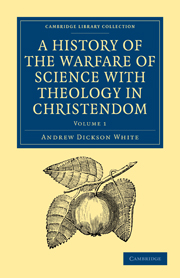Book contents
- Frontmatter
- INTRODUCTION
- Contents
- CHAPTER I FROM CREATION TO EVOLUTION
- CHAPTER II GEOGRAPHY
- CHAPTER III ASTRONOMY
- CHAPTER IV FROM “SIGNS AND WONDERS” TO LAW IN THE HEAVENS
- CHAPTER V FROM GENESIS TO GEOLOGY
- CHAPTER VI THE ANTIQUITY OF MAN, EGYPTOLOGY, AND ASSYRIOLOGY
- CHAPTER VII THE ANTIQUITY OF MAN AND PREHISTORIC ARCHÆOLOGY
- CHAPTER VIII THE “FALL OF MAN” AND ANTHROPOLOGY
- CHAPTER IX THE “FALL OF MAN” AND ETHNOLOGY
- CHAPTER X THE “FALL OF MAN” AND HISTORY
- CHAPTER XI FROM “THE PRINCE OF THE POWER OF THE AIR” TO METEOROLOGY
- CHAPTER XII FROM MAGIC TO CHEMISTRY AND PHYSICS
CHAPTER XII - FROM MAGIC TO CHEMISTRY AND PHYSICS
Published online by Cambridge University Press: 29 August 2010
- Frontmatter
- INTRODUCTION
- Contents
- CHAPTER I FROM CREATION TO EVOLUTION
- CHAPTER II GEOGRAPHY
- CHAPTER III ASTRONOMY
- CHAPTER IV FROM “SIGNS AND WONDERS” TO LAW IN THE HEAVENS
- CHAPTER V FROM GENESIS TO GEOLOGY
- CHAPTER VI THE ANTIQUITY OF MAN, EGYPTOLOGY, AND ASSYRIOLOGY
- CHAPTER VII THE ANTIQUITY OF MAN AND PREHISTORIC ARCHÆOLOGY
- CHAPTER VIII THE “FALL OF MAN” AND ANTHROPOLOGY
- CHAPTER IX THE “FALL OF MAN” AND ETHNOLOGY
- CHAPTER X THE “FALL OF MAN” AND HISTORY
- CHAPTER XI FROM “THE PRINCE OF THE POWER OF THE AIR” TO METEOROLOGY
- CHAPTER XII FROM MAGIC TO CHEMISTRY AND PHYSICS
Summary
In all the earliest developments of human thought we find a strong tendency to ascribe mysterious powers over Nature to men and women especially gifted or skilled. Survivals of this view are found to this day among savages and barbarians left behind in the evolution of civilization, and especially is this the case among the tribes of Australia, Africa, and the Pacific coast of America. Even in the most enlightened nations still appear popular beliefs, observances, or sayings, drawn from this earlier phase of thought.
Between the prehistoric savage developing this theory, and therefore endeavouring to deal with the powers of Nature by magic, and the modern man who has outgrown it, appears a long line of nations struggling upward through it. As the hieroglyphs, cuneiform inscriptions, and various other records of antiquity are read, the development of this belief can be studied in Egypt, India, Babylonia, Assyria, Persia, and Phœnicia. From these civilizations it came into the early thought of Greece and Rome, but especially into the Jewish and Christian sacred books. Both in the Old Testament and in the New we find magic, witchcraft, and soothsaying constantly referred to as realities.
The first distinct impulse toward a higher view of research into natural laws was given by the philosophers of Greece.
- Type
- Chapter
- Information
- A History of the Warfare of Science with Theology in Christendom , pp. 373 - 415Publisher: Cambridge University PressPrint publication year: 2009First published in: 1896



